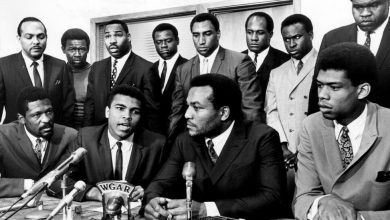Have Republicans Learned Anything From Their Dance With the Donald?

Donald Trump is done. I keep hearing and reading that, and I have no reason to disbelieve it: Announcing his 2024 candidacy at Mar-a-Loco on Tuesday night, he was less a phoenix rising than a balloon deflating. I could almost hear the helium seeping out of him.
But while that should have been music to my ears, it wasn’t. The prompt for his sudden abandonment by many Republicans is all wrong. They’re rejecting him not because of the countless ways in which he inflamed and imperiled this country, not because he’s an offense to decency and an enemy of democracy, not because he degrades almost anything and anyone he brushes up against. They’re just peeved at his losing streak.
It’s about math, not morals, and for that reason, there will quite possibly be a next Trump and a Trump after that. I don’t mean Ivanka, his fair-weather fair-haired daughter, whose self-absorption is self-evident in the studied distance she now keeps from dotty old Dad. I don’t mean Don Jr., who has her gift for grift but not her guile.
I mean someone whose case to Republicans is about the attainment of power, not the exercise of principle, which the party torched in its dance with the Donald. As best as I can tell, it hasn’t learned any lesson from that. It’s just trying to plot a path out of the ashes.
Look at and listen to the language of the Republicans who are making and urging a turn from Trump.
“He’s an impediment at this point,” Andy Reilly, a member of the Republican National Committee in Pennsylvania, said in an article in The Times by Lisa Lerer and Reid Epstein. An impediment, mind you — not an offense, not an outrage, not a menace. At this point. A month ago, in the same noxious guise, Trump was wholly acceptable. And if Mehmet Oz, Blake Masters, Don Bolduc and a few others had won on Nov. 8, he still would be.
In an article in Bloomberg by Flavia Krause-Jackson, a billionaire donor opined that “the Republican Party is ready to move on” from someone he called “a three-time loser,” apparently referring to the 2018, 2020 and 2022 elections. What about moving on from a fabulist, fraud and would-be autocrat? Aren’t those the more damning descriptors? Obviously not, because they fit Trump before his serial defeats and Republicans rallied merrily around him nonetheless.
“I think he’s the only Republican who could lose,” Mick Mulvaney, Trump’s former chief of staff, told Anderson Cooper on CNN, saying that the party had better candidates for 2024. And The Wall Street Journal editorial board implored Republicans who are sizing up 2024 presidential prospects not to nominate “the man most likely to produce a G.O.P. loss and total power for the progressive left.” Trump’s recent track record and questionable shot at victory are the disqualifyingissues, when so much else should be.
There’s no reckoning at hand, none of the necessary grappling with all that Republicans condoned under Trump, with how perilously close to the edge they pushed America. There’s no reclamation of rectitude by a party that once bragged of a monopoly on it.
There’s just a new calculation. Republicans talk of Trump as if he’s a stock that has lost value. But the values that they betrayed in their surrender to him? They ignore or gloss over that part.
Through two impeachments, countless examples of incompetence, the profoundly destructive claim that election results couldn’t be believed and the deadly violence of Jan. 6, Trump retained the party’s support because its leaders ran the numbers and deduced that the price of shunning him was too high. In the wake of the midterms, not shunning him seems to be the costlier play.
The party hasn’t changed any more than he has. Only the numbers are different.
Words Worth Sidelining
Figurative expressions are like tinsel on the tree of language: They give it whimsy and luster — except when they’re garishly overdone and just weigh it down. And at the end of the day, “at the end of the day” does precisely that.
At least that’s your verdict. When I began this feature of the newsletter several months ago and invited you to nominate words and phrases that you’d had enough of, “at the end of the day” drew as much protest as anything else. A veritable mob of you came for it, like torch-bearing villagers on the trail of the linguistic Frankenstein monster.
Sam Kalter of Tucson, Ariz., raged about how frequently and banally “at the end of the day” rolls off the tongues of athletes who, Kalter wrote, utter platitudes at news conferences along the lines of: “At the end of the day, it’s all about blocking up front.”
“No,” Kalter protested. At the end of the day, “it’s actually time to hit the sack.”
Allan Hotlen of Boca Raton, Fla., wrote that “whenever someone I know uses this hoary phrase, I add, ‘Comes the night!’ My brilliant mot justehasn’t stopped anyone I know from using ATEOTD.”
I love that Hotlen turned “at the end of the day” into an ICYMI-style string of initials to avoid giving it more exposure. I love that he trotted out “mot juste.” But I especially love his “hoary,” a word I occasionally type (it means, in this context, exhausted from overuse) but hesitate to say, lest people think I’m using some invented synonym for “promiscuous” (whore-y).
I don’t love “at the end of the day” but I don’t hate it as much as many of you apparently do. Why your antipathy?
Part of the reason, I suspect, is its oppressive ubiquity. When a phrase circulates as, well, promiscuously as ATEOTD does, it’s less a considered choice than a lazy reflex, its meaning eroded by mindless repetition. It’s a squandering of breath (if you’re saying it), a waste of screen space (if you’re writing it).
But many phrases fit that bill. The most grating of them are the ones with so many ready understudies. And the part of ATEOTD can be played by “in the final analysis,” “when all is said and done,” “all told,” and “all things considered,” to name four phrases that come immediately to mind. They do the same work as ATEOTD and do it more precisely. Most do it more economically, too.
Finally, the figurative aspect of ATEOTD isn’t especially artful or clever. It’s obvious. And it’s semantically, phonetically and alphabetically dull — all those one-syllable words, the longest just three letters. Our tongues are nimbler than that. Our brains are bigger. And our sensibilities are more refined, which is why, at the end of the day, I stop drafting this newsletter and mix myself a cocktail.
“Words Worth Sidelining” will continue to appear every month or so, at least for a while.
For the Love of Sentences
Many of you swooned for Ron Charles’s commentary, in his Washington Post Book Club newsletter, on the same-day releases of new memoirs by Mike Pence (“So Help Me God”) and Michelle Obama (“The Light We Carry”). “It hardly feels like a fair contest,” Charles wrote. “Michelle Obama is one of the most popular and dynamic public figures in the world. Mike Pence once lulled a fly to sleep on his own head.”
That’s toward the start of Charles’s assessment. Its finish: “Despite protecting the Union from its greatest threat in 160 years, Pence describes that calamity with all the verve and insight of a man telling us how he loads the dishwasher. It’s a peculiar act of historical revisionism — as though the paragraphs have been sprayed with a mixture of fire retardant and Ambien.” (Thanks to Patricia Valiton of San Diego and Adrienne Dern of Silver Spring, Md., among others, for nominating this.)
Also in The Washington Post, Joel Achenbach explored doomsday scenarios of the cosmological rather than political kind, recounting: “A few days before NASA tried to crash a spacecraft into an asteroid as part of what it called the Double Asteroid Redirection Test, I talked to Lindley Johnson, the agency’s planetary defense officer. I think we can all agree that this sounds like an important job.” (Steve Chertock, Alexandria, Va.)
On the Morning Brew website, Neal Freyman mentioned a Tampa Bay Buccaneers-Seattle Seahawks game to be played in, of all places, Munich: “Germans, despite living an entire ocean away from any N.F.L. stadium, enjoy American football more than they like stringing together consonants.” (Merrio Morton, Lancaster, S.C.)
In Wine-Searcher, Oliver Styles scoffed at so many sommeliers’ pretentious Instagram videos, which tend to show “a crowd of gray-suited minions opening an ancient bottle of Port with red-hot tongs and with the long-faced solemnity of a group of vets trying to artificially inseminate the world’s last panda.” (Kami Lee Robb, Puerto Vallarta, Mexico)
Assessing the poor turnout of registered voters in his state, Mike Davis wrote in the Asbury Park Press: “Most New Jersey voters treated the 2022 midterms more like the ‘meh’-terms.” (Sandy Ingham, Marlboro, N.J.)
In The New Yorker, Jelani Cobb surveyed recent history: “In the seven years since Trump took his ride down the gold-colored escalator in Trump Tower to declare his candidacy for president of the United States, the movement that coalesced around him has died a thousand deaths, only to climb out of its shallow grave before the first trowel of dirt hit the casket.” (Jean Sandhofer, Suffield, Conn., and Jim McDonald, Portland, Ore., among others)
In The Times, James Poniewozik took the measure of the television megahit “Yellowstone,” set in Montana: “There are wolves and sex and a wolf watching characters have sex. There are gunfights and fisticuffs and bombings. So many people die over the first four seasons, you wonder how Montana’s population grew enough to get a second congressional seat.” Folding a Joni Mitchell allusion into a description of the protagonist’s predicament, James noted all the “greedy tycoons who want to buy or steal Dutton’s property and build casinos, condos and ski chalets — to pave paradise and put up a Park City.” (Stephen Hook, Colorado Springs, and Eric Van Loon, Concord, Mass.)
And Alexandra Jacobs, panning the new biography “The Queen: Her Life,” noted the prodigious output of its author, Andrew Morton, about the entire royal family: “He could have written a stand-alone biography of Elizabeth in his sleep — and now perhaps he has.” (Stephen Bubul, Minneapolis, and Alice Cotten, Chapel Hill, N.C., among others)
To nominate favorite bits of recent writing from The Times or other publications to be mentioned in “For the Love of Sentences,” please email me here, put “Sentences” in the subject line and include your name and place of residence.
What I’m Reading, Watching and Doing
-
My friend Karen Tumulty, a columnist and deputy editorial page editor for The Washington Post, just wrote this poignant tribute to Michael Gerson, who was a fellow columnist at The Post and, earlier, a speechwriter for President George W. Bush. Its message — about the importance of an open mind, a generous heart and grace — is one we all need. Gerson died early today at 58. For a glimpse into his own heart, read this column of his about loving and losing a dog and welcoming a new one into his home. (My apologies if you hit the paywall; no control over that.)
-
I can’t get the new movie “Tár,” starring Cate Blanchett as a trailblazing (and tyrannical) symphony conductor, out of my head. It’s almost perversely challenging in the pacing of its first 90 minutes, though it’s planting seeds that flower hauntingly later on. Then its last 30 minutes are a cinematic wind sprint in which a few developments aren’t satisfyingly clear. But there’s such astonishing craftsmanship throughout, including Blanchett’s titanic performance, and it’s one of the smartest and subtlest examinations of power — how it’s seized, wielded and exchanged — that I’ve seen onscreen. People will be talking about it for a long time.
-
Many of you wrote to thank me for recommending the first season of the BBC drama “The Capture,” streaming on Peacock. Peacock recently made the second season available, and I’m sorry to say that it’s a bit of a letdown, belabored and illogical in ways that the first season wasn’t. Even so, I had fun watching it, perhaps in part because I’m a binge-watch loyalist. Heck, I stuck with “House of Cards” long past the point of reason, until its staggeringly cockamamie conclusion.
-
If you live near Duke University, I’ll be talking with Tumulty, Olivia Nuzzi of New York magazine and Melissa Harris-Perry of WNYC at 1 p.m. Saturday about the midterms and the media. The panel discussion (details here) is free and open to the public.
On a Personal Note
Several readers have admonished me — in a kind, caring way — for my infrequent updates about my eyesight. But there’s nothing to tell. Or at least there won’t be unless there’s a lot to tell. My affliction isn’t progressive. My right eye quit working properly overnight. If my left eye joins the strike, it’ll do so with similar suddenness and without advance warning.
And one-eyed living is wholly manageable. But does it explain certain errors? In the case of a recent blunder, I sure hope so.
I was out driving when a hailstorm started. The pellets came down violently; for about three minutes, they sounded like bullets riddling my roof and windshield. And as I wondered how my car could possibly emerge unscathed, I noticed a thin, ridged six-inch line stretching horizontally across a patch of the windshield.
Great. Just great. Now I’d have to fit auto repair into an overloaded schedule.
I called my insurer. An agent approved a new windshield, saying that little cracks could become big ones quickly. I made an appointment at, and pulled up to, a glass shop. A workman approached my car to size up the damage.
“This the crack?” he said, pointing to it. His tone of voice was odd.
“Yes,” I answered.
“Lower the window,” he said. I did, and he reached inside and … peeled the crack away.
It was a strip of hardened glue. Which I’d never noticed before the hailstorm. From some source I couldn’t remember. Doing an uncanny impersonation of shattered glass. At least in my estimation.
And I’m taking the position that my estimation was significantly influenced by, if not entirely attributable to, my Cyclops status, because the alternative is that I’m an alarmist. Or an idiot. Or both.
And while I’ve been confronted with those possibilities many times before, I figure the silver lining of my clouded vision should be my ability to pin various humiliations and failings on it.
So: How’s my eyesight?
Imperfect. But a perfect fall guy.




